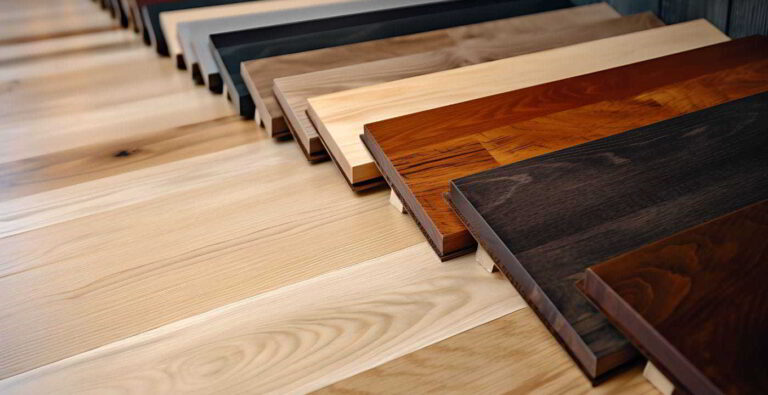
Hardwood Flooring Cost Breakdown
Here’s a simple view of cost per sq ft:
| Size by Square Feet | Low-End Estimate | Average Cost | High-End Estimate |
|---|---|---|---|
| 500 | $3,000 | $7,750 | $11,500 |
| 1,000 | $6,000 | $14,500 | $23,000 |
| 1,500 | $9,000 | $21,750 | $34,500 |
| 2,000 | $12,000 | $29,000 | $46,000 |
| 2,500 | $15,000 | $36,250 | $57,500 |
| 3,000 | $18,000 | $43,500 | $69,000 |
Materials: $4 to $12 per square foot
The price and type of hardwood affect the cost. Choices include oak, maple, Brazilian cherry, and teak, each with different features and prices.
Domestic Hardwood
Exotic Hardwood
| Hardwood Species | Average Cost per Square Foot (Materials Only) | Average Total Cost per Square Foot (Including Installation) |
|---|---|---|
| Oak | $4 – $8 | $8 – $15 |
| Maple | $5 – $9 | $9 – $16 |
| Hickory | $6 – $10 | $10 – $17 |
| Cherry | $7 – $11 | $11 – $18 |
| Walnut | $8 – $12 | $12 – $19 |
| Ash | $6 – $10 | $10 – $17 |
| Birch | $5 – $9 | $9 – $16 |
| Teak | $9 – $13 | $13 – $20 |
| Mahogany | $10 – $14 | $14 – $21 |
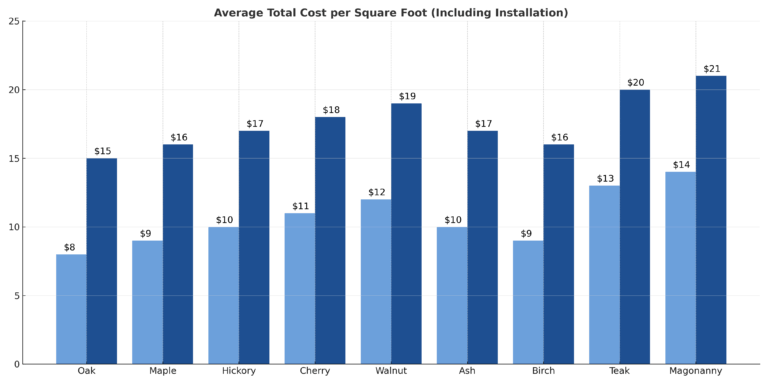
Labor: $4 to $8 per square foot
Labor costs can be 50% to 70% of the total. Getting professionals ensures hardwood floors are put in right, for a perfect finish.
Labor usually includes installing the floor and preparing the subfloor, as well as final details.
Installation
Putting in hardwood floors needs care and skill for a smooth look. Installers might charge $4 to $8 per square foot, depending on the job’s difficulty and local rates.
Finishing
Besides installation, labor can include finishing services like sanding, staining, and sealing. These steps make the floors look good and last longer.
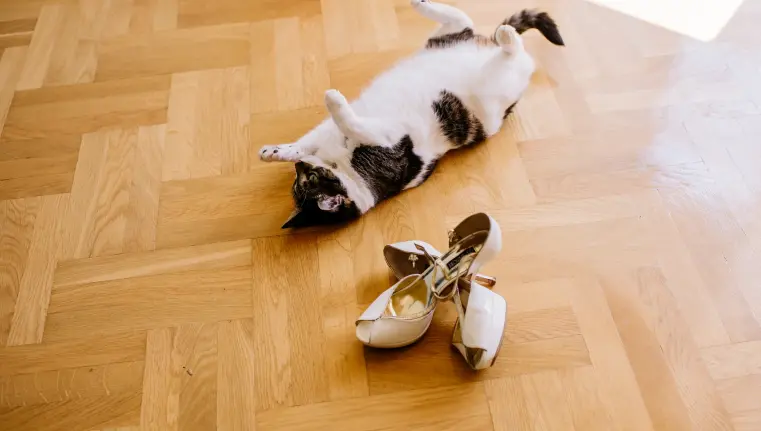
Subfloor Preparation: $1 to $2 per square foot
Getting the subfloor ready is important for strong and long-lasting hardwood floors. This means making sure surfaces are even, fixing any damage, and adding moisture barriers.
Leveling
If the subfloor is uneven or damaged, leveling it is needed to make a smooth base for hardwood. Leveling usually costs $1 to $2 per square foot, based on the work required.
Moisture Protection
Moisture can harm hardwood floors, so adding a moisture barrier is key, especially in wet areas. The cost for moisture barriers is usually $1 to $2 per square foot.
Removal of Existing Flooring: $1 to $3 per square foot
Before putting in new hardwood floors, old floors like carpet, tile, or laminate might need to be taken out. This makes sure the new hardwood goes on a clean and flat surface.
Carpet Removal
Taking out carpet usually costs $1 to $2 per square foot. The cost depends on the carpet type and if there is padding underneath.
Tile or Laminate Removal
Taking out tile or laminate might need more work and tools, so it costs a bit more, about $2 to $3 per square foot.
Summary of hardwood flooring cost breakdown:
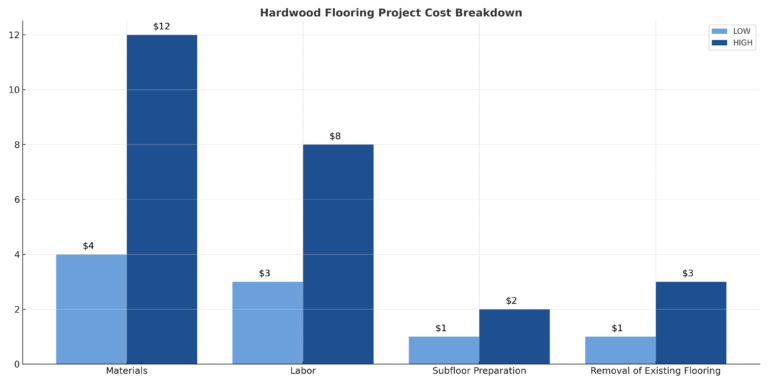
Solid Hardwood Flooring Installation
Solid hardwood flooring is known for its classic look and strength. It costs about $11 to $25 per square foot to install, including both materials and labor.
The price can change based on the wood type, how complex the installation is, and any extra services needed.
Installation Method
How we install the hardwood also affects the cost. Nail-down installation is usually cheaper than methods like glue-down or floating.
Additional Services
Sometimes, extra services are needed when installing hardwood, which can change the total cost. This might include preparing the floor, like leveling or adding a moisture barrier, to make sure the result is smooth and lasts long.
Staining or finishing the hardwood can cost more but makes the floor look nicer and last longer.
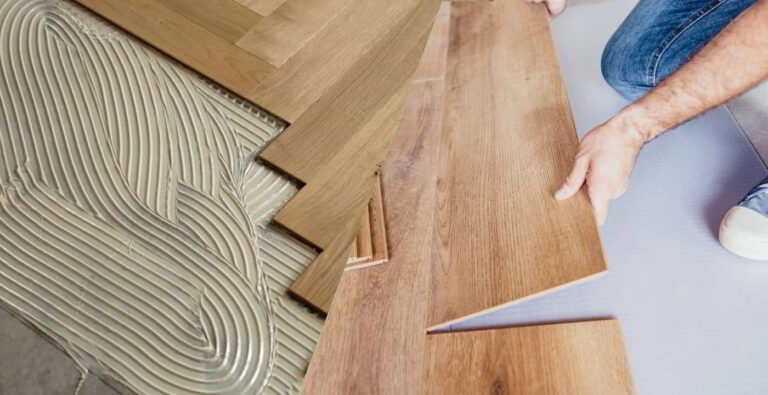
Engineered Hardwood Flooring Installation
Engineered hardwood flooring offers versatility and stability, making it a popular choice for many homeowners. The installation cost for engineered hardwood flooring typically ranges from $7 to $20 per square foot, including materials and labor.
Exotic woods or specialty finishes may increase the overall cost. Engineered wood also offers the option of veneer thickness, with thicker veneers generally being more expensive.
Installation Method
The installation method for engineered hardwood flooring can impact the overall cost. Floating installations, where the planks are not attached to the subfloor, are often quicker and more cost-effective than glue-down or nail-down methods.
Additionally, the installation’s complexity, such as over-radiant heating or uneven subfloors, may incur additional charges.
Factors that Affect Hardwood Flooring Costs
| Cost Factor | Details |
|---|---|
| Wood Type | Hardwood flooring comes in various types, each with its own price range. Common options include oak, maple, cherry, and walnut. Exotic woods like Brazilian cherry or teak tend to be more expensive. |
| Wood Quality | The quality of the wood affects its price. Engineered hardwood is often cheaper than solid hardwood but offers similar aesthetics. |
| Installation Method | The installation method can impact costs. Nail-down and glue-down installations are typically cheaper than floating floors. |
| Room Size | Larger rooms require more materials and labor, resulting in higher costs. |
| Subfloor Condition | If the subfloor needs repair or leveling before installation, it will add to the total cost. |
| Additional Features | Extras like borders, inlays, or custom designs can increase the overall cost. |
| Additional Services | Additional services include removing old flooring, leveling the subfloor, replacing underlayment, or installing baseboards. |
Professional vs DIY Flooring Installation
When it comes to installing hardwood flooring, homeowners often decide to hire professionals or embark on a do-it-yourself project.
Both options have advantages and considerations, and understanding the differences can help homeowners make an informed choice that aligns with their budget, skills, and project requirements.
Professional Installation
Advantages
- Expertise: Professional installers possess the knowledge, skills, and experience needed for precise and high-quality hardwood flooring installation.
- Efficiency: Pros use specialized tools to finish the installation quickly and within the agreed timeframe, reducing the chances of errors or delays.
- Warranty: Many offer warranties or guarantees on their workmanship, giving homeowners peace of mind knowing any issues will be promptly addressed at no extra cost.
- Professional Finish: Installers not only lay the flooring but also handle finishing touches like sanding, staining, and sealing, ensuring a flawless appearance.
Drawbacks
- Cost: Professional installation usually costs more upfront than DIY.
DIY Installation
Advantages
- Save money: DIY cuts labor costs, especially for small spaces.
- Flexibility and control: Work at your pace, customize, and adjust as you go.
- Learn new skills: Gain valuable experience through the process.
Drawbacks
- Risks mistakes affecting flooring quality, like uneven planks or improper finishing.
- Demanding and time-consuming as it involves heavy lifting and prolonged kneeling.
Ready to Turn Your Hardwood Flooring Vision Into Reality?
Choosing the right hardwood flooring is a big decision. Now that you understand the key cost factors, you’re one step closer to creating the perfect space. But you don’t have to navigate the process alone.
We’d love to help guide you through the world of hardwood flooring in a free consultation with one of our flooring installation experts. From selecting the ideal wood type to understanding installation methods and budgeting, our team is here to make sure you get floors you’ll love for years to come.
Contact us today to schedule your free in-home flooring consultation and see if we serve your area.





